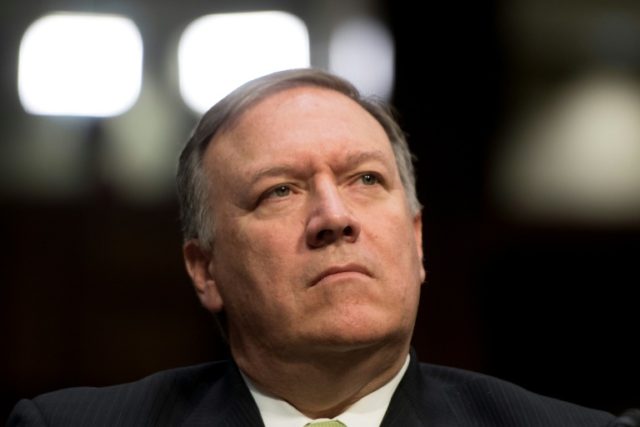Speaking at an American Enterprise Institute (AEI) forum on the future of U.S. intelligence operations, CIA Director Mike Pompeo warned that North Korea could be a “handful of months” away from plausibly threatening the continental United States with nuclear weapons.
Pompeo warned North Korea’s nuclear weapons program is advancing at a “very rapid clip.” He added that U.S. intelligence fears Kim would aggressively use nuclear weapons as a tool to conquer the entire Korean Peninsula.
Pompeo repeated his recent warnings that “North Korea is ever closer to being able to hold America at risk,” but said the intelligence community is helping to hold them just shy of achieving their goals.
“I said that was a handful of months,” he recalled. “I said the same thing several months before that. I want everyone to understand that we are working diligently to make sure that a year from now, I can still tell you they are several months away from having that capacity.”
Later in his appearance, Pompeo clarified that he was not laying out a timeline where North Korea might be fielding nuclear missiles by the end of the summer, or anything quite so immediate. He said it was inappropriate to think in terms of timelines to landmark missile test launches. Instead, the real issue is reliability—“Can they reliably deliver the pain which Kim Jong-un wants to be able to deliver against the United States of America?”
He explained:
It’s one thing to be able to say, ‘Yes, it’s possible if everything went right, if the missile flew in the right direction, we could do it,’ as opposed to certainty. This is the core of deterrence theory. In the deterrence model, you have to be certain that what you aim to deliver will actually be successful. At the very least, you need to make sure your adversary believes that it is certain.
“That’s what Kim Jong-un is driving for. He is trying to put in our mind the reality that he can deliver that pain to the United States of America. Our mission is to make the day that he can do that as far off as possible,” Pompeo said.
He disputed the commonly reported notion that the intelligence community was caught by surprise when North Korea’s nuclear program surged forward. “We’ll never get the week or the month right on something that’s this complicated, but we can get the direction of travel and the capacity for the rate of change right, and we did,” he insisted.
During a question-and-answer session with AEI’s Marc Thiessen, Pompeo cautioned that he was not at liberty to divulge sensitive intelligence about North Korea, other than to say, “They have moved at a very rapid clip, make no mistake about it.”
“They’re testing capacity has improved. The frequency that they have tests which are more materially successful has also improved, putting them ever closer to a place where Americans can be held at risk,” he said.
Pompeo said the CIA believes Kim Jong-un to be a “rational actor,” and that his rational strategy is about more than achieving deterrence against conventional military action by the United States and its allies since the massive North Korean artillery threat to South Korean cities already provides such deterrence.
Pompeo said the CIA believes that Kim wants “more than just regime preservation,” which is why the Trump administration is so determined to prevent him from achieving nuclear ICBM capability. They suspect Kim will not be content to become merely the latest authoritarian ruler sitting on an inventory of nuclear weapons he would never dare to use.
Thiessen asked if Kim’s status as a “rational actor” meant limited military action to dismantle North Korea’s nuclear program is possible since a rational state would not respond in a manner that guaranteed its own destruction.
“I’m thrilled that you asked that. I’m equally happy not to answer,” Pompeo replied. “Let me say this, though: the American people should know we’re working to prepare a series of options to make sure that we can deliver a range of things, so the president will have the full suite of possibilities.”
“We are in a much better place today than we were twelve months ago,” he said. “We are still suffering from having gaps. Part of that is not the intelligence community’s fault per se. These are difficult target sets. I’ll concede that at the outset. But it’s completely inadequate for the CIA to say, ‘Well, that’s a hard problem.’ Of course it’s a hard problem. That’s why you pay us.”
He said the CIA’s top priorities in North Korea included analyzing its command structure, determining how sanctions affect various individuals and layers of North Korean society, and who might be helping the Kim regime mitigate the effects of sanctions.

COMMENTS
Please let us know if you're having issues with commenting.